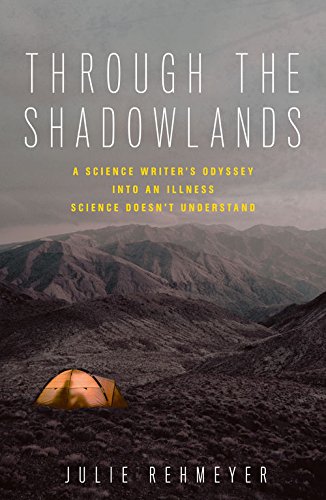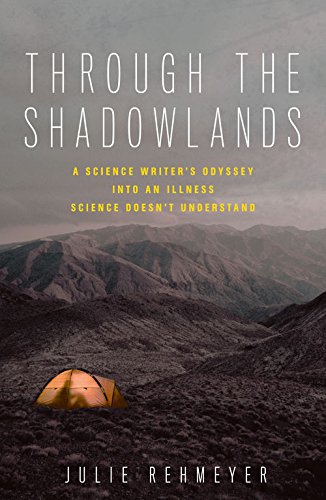I just finished reading Through the Shadowlands: A Science Writer’s Odyssey into an Illness Science Doesn’t Understand by Julie Rehmeyer. It’s a memoir about the author’s journey through Myalgic Encephalomyelitis/Chronic Fatigue Syndrome (ME/CFS). It’s a beautifully written, thoughtful, insightful look at ME/CFS, and how Rehmeyer got through the harrowing illness and regained her health.
Many floxies deal with horrible, intractable fatigue, and suffer from ME/CFS after getting poisoned by Cipro, Levaquin, Avelox, or other fluoroquinolones. I experienced some fatigue while going through fluoroquinolone toxicity, but I never considered myself to be afflicted with ME/CFS (my fatigue episodes passed relatively quickly–thank God). However, the bouts of fatigue I had were frightening, and going through my own “mysterious illness” gave me empathy for others dealing with under-acknowledged diseases. I became facebook friends with several people in the ME/CFS community, and I gained an even greater appreciation for the severity of ME/CFS and the strength it takes to endure it. It truly is a horrific disease, and the horror of it is only compounded by the lack of acknowledgement it receives.
I hope that Rehmeyer’s book brings attention to ME/CFS, and that people recognize how severe and devastating the disease truly is. And I hope that recognition of ME/CFS brings attention to all multi-symptom, chronic, mysterious illnesses that “can’t be reduced to tidy pathologies or a uniform set of symptoms.” These illnesses are real–they are not “just in your head,” and they are less “rare” than people would like to acknowledge. Yet these illnesses are systematically overlooked because they are too complex to form a single hypothesis around. Autoimmune diseases, neurodegenerative diseases, autonomic nervous system diseases, mitochondrial dysfunction diseases, fibromyalgia, ME/CFS, POTS, EDS, and, of course, iatrogenic diseases like fluoroquinolone toxicity, are complex and multifaceted, and they affect every part of the body and every individual differently. They’re difficult to study, but studying them is important. Ignoring them, and pretending that they don’t exist, isn’t helpful to anyone.
Some parts of Through the Shadowlands: A Science Writer’s Odyssey into an Illness Science Doesn’t Understand really resonated with me, and reminded me of my experience with fluoroquinolone toxicity. I’m going to point them out here, along with comments, with the hope that they will trigger in you some of the recognition they triggered in me.
In the epilogue, Rehmeyer states:
“Although I’ve certainly worked hard to improve my health as I have, I also want to be clear: I got lucky. I could have done everything I did and still be desperately ill. I think I get some credit for my improvement, but only some. A big part of it is simple good fortune.”
Yup. I’ve been meaning to write a post about the luck aspect of recovery for a while. Why did I recover from fluoroquinolone toxicity when others don’t? Luck. Pure, simple, unfair, ridiculous, stupid luck. I got lucky. I was able to get into a spiral of health. Early in Through the Shadowlands, Rehmeyer says that health and illness are like valleys between hills, and your state of being is like a marble (or boulder–depending on how big your metaphorical valleys are) that is trapped in that valley. It’s easy to stay in the valley–whether that be the health valley or the illness valley. It’s difficult to push yourself up a hill into the other valley. (Hopefully I’m remembering the metaphor roughly correctly–sorry if not.) I was able to get over that hill, into the valley of health, and I was able to do it without near as much suffering as others. Why? Luck. I’m not a better person, nor did I do more things correctly. I was just luckier.
In chapter 19: Moldy Science, Rehmeyer states:
“Learning all this, I felt as if my brain were quietly exploding. A scientific organization put out a statement that was contrary to science, and scientists couldn’t get it removed for 12 years! How could that happen?
And if respected organizations could sow doubt about whether mold is a significant risk factor for asthma–a link that had been observed in the very first textbook on asthma ever written, in 1698–what hope did I have that science would come to understand my weird illness?”
Science is political. You knew that, right? It’s not supposed to be, but it is, so don’t think it’s not.
Just as there have been scientists silenced about the dangers of mold for decades, there are scientists who recognized that topoisomerase interrupting drugs, like fluoroquinolones, are a very bad idea, and are quite harmful to mitochondrial and bacterial DNA. Perhaps messing with our mitochondrial and bacterial DNA and RNA replication enzymes isn’t a particularly good idea. But if a scientist was to say something as brazen as that he or she would be admonished, and maybe even punished.
Throughout Through the Shadowlands, Rehmeyer seems to struggle with her worldview. Is she a scientist who only does treatments that are backed up by placebo controlled trials, or is she a person who is willing to try anything to get better, even if it has a woo-woo component to it? If she tries the alternative treatments, can she still consider herself to be a skeptical scientist? But if science is failing her, and her fellow ME/CFS sufferers, does it deserve the credence and weight she gives it? After a significant struggle, Rehmeyer seems to settle on the approach that depends more on evidence gathered from her personal experience than evidence gathered in labs. She opens herself up to alternative treatments, and reluctantly finds that they help her. She seems to long for evidence of why they help her, and to struggle with the possibility that they are just placebos. At the end of the book, it seems that Rehmeyer stops trying to find identity in the science vs. alternative medicine paradigm, and she settles into a worldview that identifies her as a person with ME/CFS, who has overcome the disease, and who is now part of that tribe. The scientist and woo-woo tribes are less significant, what is significant is her tribe of fellow sufferers (and her family and other loved ones).
In chapter 11: An Unlikely Hypothesis, Rehmeyer writes about the facebook community of fellow ME/CFS sufferers. She states:
“My attitude toward my fellow patients had already started to soften as I had been exploring the forum more, and on Facebook, I found them endearing, and even inspiring. I saw how they turned to one another not just for advice as on the forum, but for a community and support and a social life after they’d been abandoned by so much of the world.”
I find the floxie community, largely found on facebook, to be incredibly inspiring. They are brave, thoughtful, generous, wonderful people, and I am honored to be among them. I also appreciate the other chronic illness communities, including the ME/CFS community, the POTS community, the floxie community, the other pharma-injured community, the fibromyalgia community, etc. All of these communities of people with chronic, poorly understood diseases are wonderfully supportive and strong, and they are appreciated.
Much of Through the Shadowlands felt familiar. I knew who many of the people were that Rehmeyer wrote about, even when she didn’t refer to them by name. I felt as if I was reading about the journey of a friend (or, at least a friend of a friend), and in some ways, I was. The community of people affected by mysterious, chronic, under-recognized illnesses is small, and we have many fights in common. We’re in this together–fighting for recognition, and cures. If Through the Shadowlands helps those suffering with ME/CFS to gain recognition and acknowledgement, perhaps it will hep floxies and others living with mysterious illnesses too.
I recommend that you read Through the Shadowlands. It’s a good book. It’s a well-written, insightful, thoughtful memoir, and I suspect that it will resonate with anyone suffering from a mysterious illness.
********
If you would like to get your microbiome sequenced through Ubiome, here is a 10% off link – http://ubiome.refr.cc/VDDLNWP .













… [Trackback]
[…] Info on that Topic: floxiehope.com/review-of-through-the-shadowlands/ […]
… [Trackback]
[…] Info to that Topic: floxiehope.com/review-of-through-the-shadowlands/ […]
… [Trackback]
[…] Read More here on that Topic: floxiehope.com/review-of-through-the-shadowlands/ […]
… [Trackback]
[…] Read More Information here to that Topic: floxiehope.com/review-of-through-the-shadowlands/ […]
… [Trackback]
[…] Here you will find 22970 additional Information to that Topic: floxiehope.com/review-of-through-the-shadowlands/ […]
… [Trackback]
[…] There you can find 60399 more Info on that Topic: floxiehope.com/review-of-through-the-shadowlands/ […]
… [Trackback]
[…] Here you can find 22376 additional Info on that Topic: floxiehope.com/review-of-through-the-shadowlands/ […]
… [Trackback]
[…] Information on that Topic: floxiehope.com/review-of-through-the-shadowlands/ […]
… [Trackback]
[…] Here you will find 18710 additional Info on that Topic: floxiehope.com/review-of-through-the-shadowlands/ […]
… [Trackback]
[…] Find More Info here on that Topic: floxiehope.com/review-of-through-the-shadowlands/ […]
… [Trackback]
[…] There you will find 41395 more Information on that Topic: floxiehope.com/review-of-through-the-shadowlands/ […]
… [Trackback]
[…] Read More Information here to that Topic: floxiehope.com/review-of-through-the-shadowlands/ […]
… [Trackback]
[…] Read More Info here on that Topic: floxiehope.com/review-of-through-the-shadowlands/ […]
… [Trackback]
[…] Find More on that Topic: floxiehope.com/review-of-through-the-shadowlands/ […]
… [Trackback]
[…] Find More Info here on that Topic: floxiehope.com/review-of-through-the-shadowlands/ […]